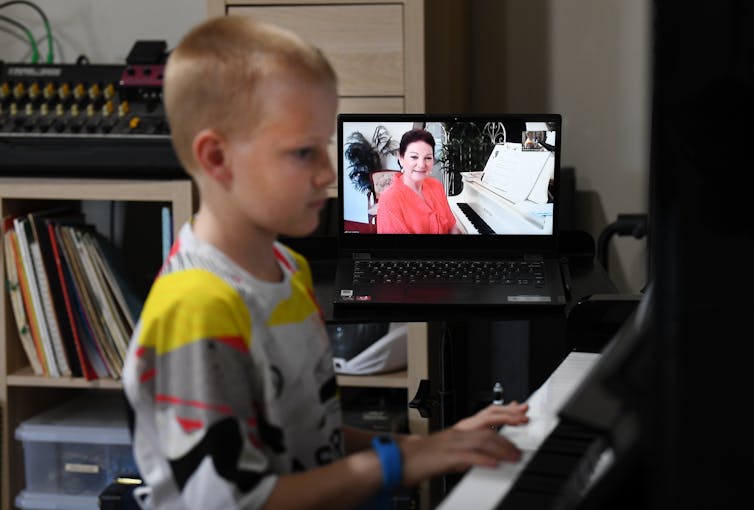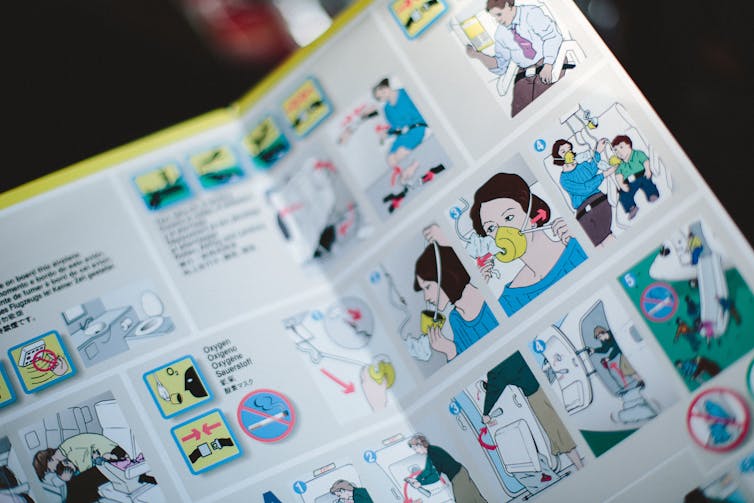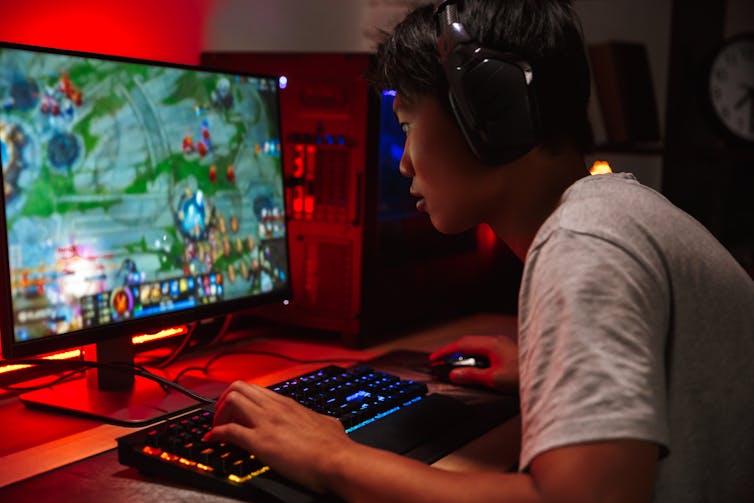Students’ well-being must always be the priority. Here are 5 tips to help them through lockdown
- Written by Nicole (Nikki) Brunker, Lecturer in Education, University of Sydney
We all know the challenges lockdowns are creating[1] for our children during the COVID-19 pandemic. However, providing effective support for their social and emotional well-being may help us look beyond fears to the possibility of making gains during this interruption to our familiar lives.
Social and emotional well-being relates to the ability to understand ourselves, and others, and to manage life’s challenges. This calls for skills such as being able to:
- understand and engage with our emotions and the emotions of others
- form and build positive relationships
- take on and persist with challenges.
Read more: Students in Melbourne will go back to remote schooling. Here's what we learnt last time and how to make it better[2]
Well-being[3] is a broad concept that encompasses the individual and their context, recognising variation among children. It’s crucial to remember well-being is a process of both experience and development, so skills vary with age and circumstances.
Well-being is greatest cost of lockdowns
Loss of well-being was shown to be the greatest cost[4] of lockdowns for students schooling from home in 2020.
The experience of schooling during lockdown varies, but the greatest impact is that it makes existing inequities worse[5]. The lives of too many children and young people are filled with enormous difficulty and limited opportunities. This was the case before lockdown[6], but the problem has grown.
Schools continue to work tirelessly to meet students’ needs[7]. It is important to recognise there are social issues that require extensive work beyond schooling.
 A student receives a piano lesson from his teacher while Brisbane was under lockdown this year, but it isn’t just schooling needs that must be met.
Dan Peled/AAP
A student receives a piano lesson from his teacher while Brisbane was under lockdown this year, but it isn’t just schooling needs that must be met.
Dan Peled/AAP
Read more: Remote learning didn't affect most NSW primary students in our study academically. But well-being suffered[8]
Developing skills helps with well-being
The individual aspect of social and emotional well-being involves the ongoing development of key skills. These skills have been variously termed soft skills, 21st-century skills, general capabilities, and dispositions. These skills grow and develop as our life experience expands and the challenges we encounter become more complex.
The benefits of developing social and emotional well-being are important in themselves. However, research has long shown the benefits extend to academic learning[9].
Well-being skills have been recognised as helping students with schooling during lockdown. Self-organisation, autonomy[10] and adaptability[11] enable students to thrive during lockdown. Schooling during lockdown also provides an opportunity to develop these skills in the context of life’s other challenges.
Read more: Students who are more adaptable do best in remote learning – and it's a skill we can teach[12]
What can we do to support children’s well-being?
What can we do to support our children’s well-being in lockdown and beyond through the pandemic?
1. Focus on the potential gains.
We don’t simply “bounce back” from adversity; we need to be able to move forward[13] by supporting our children to work with the challenge of adversity. This includes adults in their lives modelling how to do that, which helps children develop the skills to cope with further adversity that they will inevitably face in their lives.
Research is not showing learning loss[14] through schooling under lockdown, as the latest NAPLAN results also indicate[15]. It is showing gains can be made by working with the situation[16].
Read more: Early NAPLAN results show promise, but we don’t know the full impact of COVID school closures yet[17]
2. Look after our own well-being.
Remember the oxygen mask principle[18] – we need to take care of ourselves to be able to support our children’s well-being. Children develop the skills to self-regulate[19] – that is, they learn to understand and manage their own emotions – when supported through co-regulation with adults[20]. We can only do that when we are taking care of our own well-being.
 The oxygen mask principle: you must first take care of yourself so you are able to take care of others.
Calle Macarone/Unsplash[21]
The oxygen mask principle: you must first take care of yourself so you are able to take care of others.
Calle Macarone/Unsplash[21]
3. Attend to daily essentials for all.
Play[22], exercise, get outdoors, socialise and monitor engagement with news media[23]. Each of these activities will look different from what we would choose outside of lockdown, and there are lots of possibilities.
Engaging in unfamiliar ways of doing our everyday activities builds our well-being by developing our ability to be flexible in our thinking and adapt[24] to changing situations.
Read more: 5 tips from a play therapist to help kids express themselves and unwind[25]
4. Develop personal skills.
Key skills include self-organisation, autonomy, flexible thinking and adaptability. Well-being is learned through explicit approaches, life experiences and modelling.
We can support children by helping with routines and organisation to enable them to not be overwhelmed.
At the same time, encourage independence through activities they complete without you, such as a Lego challenge. Some other simple things to do include: encourage reading[26], play board games, promote creative (tech-free) play[27] and teach simple strategies to cope with stress such as the 5, 4, 3, 2, 1 grounding technique[28].
Read more: Books offer a healing retreat for youngsters caught up in a pandemic[29]
5. Adjust expectations to the situation.
As we adapt to the circumstances, our expectations need to adapt. Kids will have more screen time for schooling, socialising and, yes, gaming[30], which will support their well-being.
 Allowing children time away from schooling will benefit their well-being – and, yes, that includes gaming.
Shutterstock[31]
Allowing children time away from schooling will benefit their well-being – and, yes, that includes gaming.
Shutterstock[31]
Read more: Time well spent, not wasted: video games are boosting well-being during the coronavirus lockdown[32]
Kids will get distracted, have ebbs and flows in motivation, won’t complete everything for school, will refuse to do some things and will need to take time away from schooling. Give space for this to be acceptable. Remember to model how you manage your own distractions and other responses to working in this different context.
Also, stress looks different in kids. They might be rude, defiant, angry and avoid doing things - even the things they love.
The dominant approach to children’s behaviour at home and school is reward and punishment. It induces a stress response to trigger change in behaviour[33], so only escalates the stress our children are experiencing now.
Talk and listen to each other’s concerns to find solutions. Recognise when things aren’t a priority for now, such as cleaning their bedroom every week.
There is room for us to gain from the experience of lockdown. We might just need to shift our focus.
References
- ^ challenges lockdowns are creating (www.rchpoll.org.au)
- ^ Students in Melbourne will go back to remote schooling. Here's what we learnt last time and how to make it better (theconversation.com)
- ^ Well-being (www.aracy.org.au)
- ^ greatest cost (theconversation.com)
- ^ makes existing inequities worse (pivotpl.com)
- ^ case before lockdown (theconversation.com)
- ^ work tirelessly to meet students’ needs (www.localnewsplus.com.au)
- ^ Remote learning didn't affect most NSW primary students in our study academically. But well-being suffered (theconversation.com)
- ^ benefits extend to academic learning (journals.sagepub.com)
- ^ Self-organisation, autonomy (www.guyclaxton.net)
- ^ adaptability (theconversation.com)
- ^ Students who are more adaptable do best in remote learning – and it's a skill we can teach (theconversation.com)
- ^ move forward (nrl.northumbria.ac.uk)
- ^ not showing learning loss (theconversation.com)
- ^ the latest NAPLAN results also indicate (www.theage.com.au)
- ^ gains can be made by working with the situation (www.nzcer.org.nz)
- ^ Early NAPLAN results show promise, but we don’t know the full impact of COVID school closures yet (theconversation.com)
- ^ oxygen mask principle (link.springer.com)
- ^ self-regulate (raisingchildren.net.au)
- ^ co-regulation with adults (www.tandfonline.com)
- ^ Calle Macarone/Unsplash (unsplash.com)
- ^ Play (theconversation.com)
- ^ monitor engagement with news media (www.nctsn.org)
- ^ adapt (www.sciencedirect.com)
- ^ 5 tips from a play therapist to help kids express themselves and unwind (theconversation.com)
- ^ reading (theconversation.com)
- ^ creative (tech-free) play (www.abc.net.au)
- ^ 5, 4, 3, 2, 1 grounding technique (copingskillsforkids.com)
- ^ Books offer a healing retreat for youngsters caught up in a pandemic (theconversation.com)
- ^ gaming (theconversation.com)
- ^ Shutterstock (www.shutterstock.com)
- ^ Time well spent, not wasted: video games are boosting well-being during the coronavirus lockdown (theconversation.com)
- ^ trigger change in behaviour (qz.com)

















